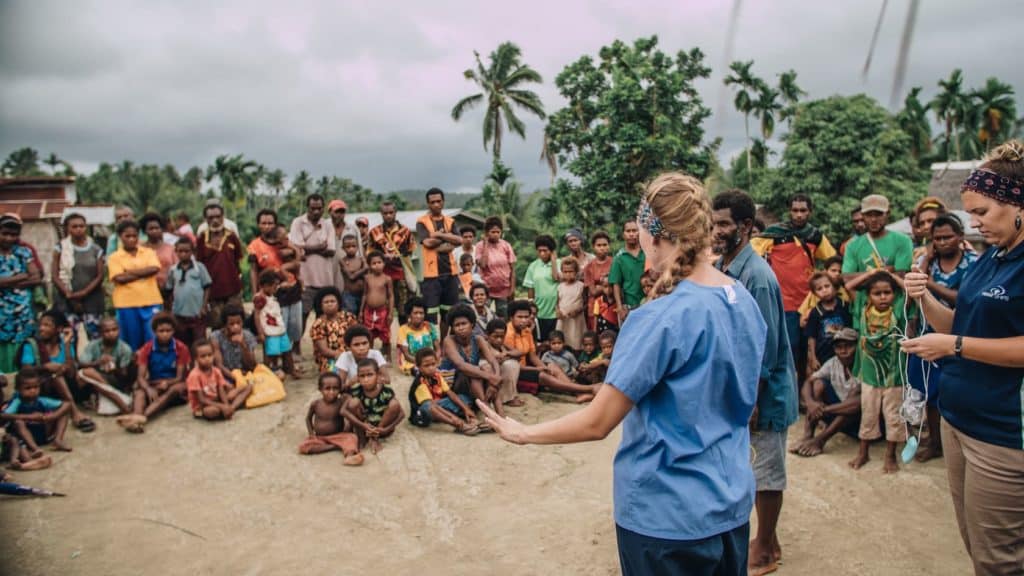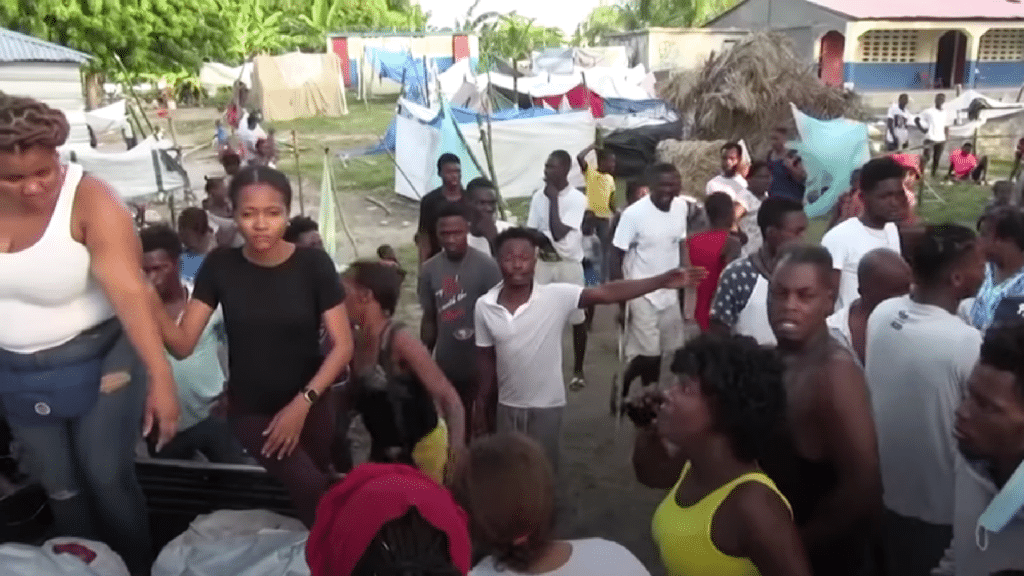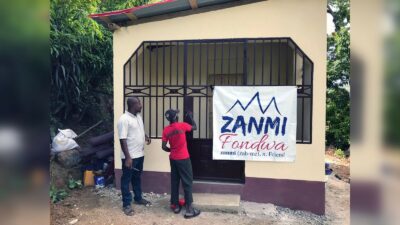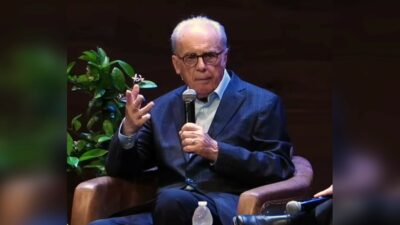The news coming from Haiti is not good. It’s not been good for years, for decades, but today it’s even worse.
Gangs now control much of the country. It is essentially a failed state, with the lowest per capita income of any country in the Western Hemisphere and among the lowest on the planet.
These are hard realities, but evangelicals need to face a hard reality of our own when it comes to Haiti. The country has also been the beneficiary of more aid and missionary effort from evangelicals than any other country over the past half-century, and the time has come to ask if our helping — however good our intentions — has hurt.
Haiti is a particularly interesting case study to examine this question because it shares space on the island of Hispaniola with the Dominican Republic. With similar culture, geography, climate, and natural resources, we might expect the countries to be similar in both Christian influence and economic development, but that is not the case.
The Dominican Republic is by no means prosperous, but even before the recent collapse in Haiti’s economy, it had a per capita gross domestic product four times that of Haiti. Virtually every cultural indicator in the Dominican Republic, including the number of Christian believers, is higher there.
Your tax-deductible gift helps our journalists report the truth and hold Christian leaders and organizations accountable. Give a gift of $30 or more to The Roys Report this month, and you will receive a copy of “Baptistland: A Memoir of Abuse, Betrayal, and Transformation” by Christa Brown. To donate, haga clic aquí.

To be sure, there are significant differences between the two countries. One has a colonial history of Spanish control, and the other French. Voodoo and other pagan religions have a strong hold on Haiti.
But even acknowledging these differences, we should be open to asking if our attempts to help Haiti have not, in fact, had a detrimental impact. J.L. Williams — the founder of New Directions (now called Feed The Hunger) and someone who had extensive experience in Haiti — once told me, “What we are doing is not a part of the solution, but a part of the problem.”
The rise of short-term missions
One of the problems seems to be the addiction of evangelicals to the quick fix. We see this addiction in our infatuation with revivalism, a 25-word “sinner’s prayer,” evangelical media campaigns and rallies, super-sized churches and ministries.
One of the quick fixes we’ve embraced is the short-term mission trip.
Robert Priest has studied the growth in short-term mission projects. He was, for many years, a professor of mission and intercultural studies at Trinity Evangelical Divinity School. Priest said that the “number of lay people in the United States involved in short-term missions grew from an estimated 540 in 1965 to 22,000 in 1979.” By 2003, he estimated that “there were at least 1 million short-termers.” In 2008, a estudio barna concluded that 8 million Americans had been on a short-term mission trip in the previous five years.
A significant reason for the explosive growth in short term mission trips has been an explosive growth of the Evangelical Industrial Complex. Today, both for-profit and nonprofit organizations specialize in mission trips to Haiti and other countries, promoting them in the same way group tours are promoted. Pastors and other organizers often go free if they can get enough people from their church to participate.

Just because there are many more people going on mission trips doesn’t mean that things are getting better in the countries they are visiting. In fact, Priest said “the shift to short-term missions…may be the first mission movement in church history that is based largely on the needs of the missionary” and not on the needs of those to whom the missionary efforts are directed.
Haiti is a case in point. It’s possible that more Americans visited Haiti as missionaries than any other country in the history of the world — and the country has never been in worse shape.
Bob Lupton has spent a career ministering to the poor and has written such seminal books about charity and philanthropy such as “Toxic Charity” and “Theirs Is the Kingdom.”
Lupton believes it is possible that short-term mission trips have a detrimental effect. Lupton believes microlending and church and community-building programs run by Indigenous people are more effective than short-term mission projects. Some advocate for direct support of indigenous missionaries, a new paradigm in missions as reportado on earlier this year.
Unintended consequences
No one doubts the good intentions of short-term missionaries. And certainly Haiti is in such desperate shape that any effort to relieve the misery there is welcome. But it’s important to look hard at the unintended consequences of our well-intentioned efforts.
This idea is at the center of an Acton Institute film called “Poverty, Inc.” This important film highlighted a couple who wanted to adopt an orphan from Haiti.
During the adoption process, someone asked the couple of they wanted to meet the child’s mother. The question was startling. This child has a mother? Yes, and the mother loved her child and wanted to keep her, but could not care for her.
The American couple realized that for a fraction of the cost of adopting the child, this Haitian mother could keep and care for her own child. The couple realized that their good intentions were about to tear a family apart. It was a poignant moment in the movie, and it launched the American couple on a new path to create jobs in Haiti to keep families together and make them self-sufficient.
Haiti today — and the rest of the world
As I write this, the prime minister of Haiti, Ariel Henry, is essentially in exile in Kenya, unable to return to his own country because gangs control the airport. He would almost certainly be killed the moment he touched down.
Those same gangs this week released more than 4,000 prisoners — many of them former gang members who will now resume their positions and strengthen the gangs even more.
Given these dire circumstances, some time will likely have to pass before evangelicals can resume their work in Haiti, but when we do, I hope that work will look very different from the way it has looked in the past.
And, until then, American evangelicals need to remember that not all help is helpful. This insight should not freeze us into inaction. We have a duty to help. But good intentions are not enough. The Bible commands us to be gentle as doves, but also wise as serpents.
Lives, even the lives of entire nations, may depend on our ability to obey this command.
To read more on this topic, we recommend the book mentioned above, “Toxic Charity,” as well as “When Helping Hurts.” For a history of Christian charity in America, we recommend Marvin Olasky’s “The Tragedy of American Compassion.”
Este artículo fue publicado originalmente en Vigilancia del ministerio and does not necessarily represent the views of The Roys Report.
 Warren Cole Smith es presidente de MinistryWatch.com, un grupo de vigilancia de donantes. Antes de eso, Smith fue Vicepresidente de Avance de la Misión del Centro Colson para la Cosmovisión Cristiana.
Warren Cole Smith es presidente de MinistryWatch.com, un grupo de vigilancia de donantes. Antes de eso, Smith fue Vicepresidente de Avance de la Misión del Centro Colson para la Cosmovisión Cristiana.





















24 Respuestas
Would evangelicalism even exist if it moved away from the things referenced in this paragraph? Have these things become foundational to what evangelicalism is?
“One of the problems seems to be the addiction of evangelicals to the quick fix. We see this addiction in our infatuation with revivalism, a 25-word “sinner’s prayer,” evangelical media campaigns and rallies, super-sized churches and ministries.”
Excellent insights. Short-term efforts can unintentionally become feel-good-about-volunteering vacations for First World travelers. Such trips should be supervised by long-term missionaries who provide perspective and seek to eventually transfer the work to locals. Our church requires all team members to read “When Helping Hurts” while preparing for short-term projects; the content dispels common “white savior” assumptions.
“Short-term efforts can unintentionally become feel-good-about-volunteering vacations for First World travelers.” THIS part.
I began to question a lot of these “mission trips” when I heard a lot of chatter and excitement about a church team going to Kenya (complete with a safari), but silence when I asked about doing some missionary work right here on the south and west sides of Chicago.
I guess that’s not as glamorous.
Sadly, most of these missions-oriented Evangelicals fail to realize that there is much more missions work that can be and needs done in one’s own community, state, and neighborhood. But it is not as glamorous or exciting as 2 weeks overseas complete with all social media posts and selfies.
Most will be shocked by Matthew 7:21-23.
What an excellent report. Many who say no to short term trips are made to feel worse because they struggle with family, work, and financial commitments. The pastor and righteous elders then glorify those who go on these trips in many meetings and events back home.
Long term commitments are the way to go. I guess the short term trip was intended to lead serious believers into a life long commitment to a cause. Instead it has become this profit making circus.
“No one doubts the good intentions of short-term missionaries.” I do! I have always believed that for at least a fraction of short-term missionaries this is a paid adventure. Otherwise I appreciate the candor and courage of the article which is sure to ruffle some feathers.
I’ll have to read this but I’ve been pondering Haiti for a LONG long time, and I’m convinced that Voodoo and Santería wouldn’t have had the traction they’ve had if so-called Christian countries hadn’t been tightening the thumbscrews on indemnifying their former enslavers at the onset of their independence. I’m wracked with the thought that this requires repentance coupled with deep, thorough, in-kind and in-cash restitution. Tell me with a straight face that I’m wrong. I’ll take convincing but I AM fallible.
cheers…ank
…and to stay on topic, I agree with the mis-givings of the author. Whenever something becomes a ?????-commercial complex the possibility of doing more harm than good is something to be watching out for.
This well known writer ignores some key factors in the cheap shots he has written here; such as hurricanes, earthquakes, diseases, governmental corruption and American NGO’s that do dumb things like building houses miles away from communities – where no one can live without cars – and undermining local efforts with short lived solutions, e. g. killing things like a self supporting trash disposal system in Saint Marc, etc.
Also, years ago, abandoned by the French, the early Haitians destroyed all their forests for charcoal productions in order to survive at the time; which results in the washing away of top soil every time it rains. Whenever efforts have been made to replant trees, it fails for tragic reasons, such as violent storms, vandalism, and governmental corruption.
Our own government has done some stuff that one could shoot at but to blame short term mission trips for Haiti’s current chaos is totally wrong.
The Roys Report should keep a higher standard for its platform than this kind of misinformation and the armchair quarterbacks chiming in here really need to get know some American Haitians and find out the truth for themselves.
Quoting from books proves nothing in this case; so let’s all get off of our American high horses and get to know some real Haitians for better understanding.
Thank you Alan and Vivian. The short term mission trips I have seen or been a part of have been to support the work of the long term missionary. That is what every church (6 churches over 58 years) I have been a part of has done. There will always be people who take advantage and do so for greed, but to paint most short term mission trips and short term mission workers in this way is not honest reporting. It breaks my heart for all the short term volunteers who have given their money, time, heart, prayers, and compassion.
You’re a voice of reason and facts you covered about all of it. Remember the Clintons in Haiti?!!!🙄Haitians will have to learn self sufficiency and self governance over generations. In the meantime, purging the occult out of their own society seems like a spiritual battle for the church you’re talking about. Also, it will take years for anarchy to be stifled and Haitians to be healed from starvation, physical injury, grief, and loss of motivation. Next comes 21st century literacy. Meanwhile hundreds of miles of garbage and sewage line the dirt streets.
I found this article disappointingly incomplete. You start with a very strong and startling assertion that short-term mission trips are partly responsible for Haiti’s dire socioeconomic problems, but you never provide any evidence to support that assertion. Correlation does not equal causation. You don’t even suggest a mechanism by which short term trips could actually be making things worse.
I’m a believer in supporting indigenous workers as the most effective means of supporting God’s kingdom. I also believe that a well-designed short term mission trip can support that work, while a poorly-designed trip can detract from it. Without any explanation of how short term trips might be harming Haiti, your article does nothing to advance our understanding of the dynamics at play.
Thank you for speaking the truth. It seems some in this thread – who will be called goats according to Matthew 25 – are writing more falsehoods to justify their inactions.
Totally agree. Look at the money trail of NGOs and their corporate contractors. Look at what the Clintons did there-Hillary Clintons brother walked away with mine rights! Don’t blame the church
Vivian said it best above.
I appreciate the idea of looking into our missions practices and changing if and when we need to. I also believe helping local pastors and missionaries on the ground in whatever country to be most effective.
However, I find that most articles here when dealing with anything slightly evangelical tends to just be the blame game. Essentially saying Evangelicals and evangelicalism is bad and always has been. But fails to show the massive amount of good done.
Agree. While I’ve simultaneously appreciated and been saddened to read the well needed ministry investigative work. But, the tendency, it seems, is to discredit all things evangelical. And I don’t believe that is fair or accurate. Guess one can become pretty jaded given the scandals and scoundrels involved. That said, I understand it is “easier to be a critic than an author.”
This is a really good post Julie. I really appreciated the ‘when helping hurts’ book as it gives a broader, often overlooked context to ‘missions’. Here is another resource you might find interesting:
Do No Harm: How Aid Can Support Peace-Or War https://a.co/d/7xilhrw
Not an armchair quarterback here. I do not know what it means because I am not American. I’ve been on the receiving side as well as I have gone on some. I admit there is a lot of good that comes out of trips. But helps provided without prayer and long term commitment does more harm. Even the people who receive the help know after a point that the trips are events marked on the missions calendar, the pictures end up as posts on social media, and those who help are doing it to be seen.
Long term is better.
This article raises some excellent points but falls short of showing a direct correlation between short-term mission endeavors and the struggles that Haitians face. Data is missing! Positive and productive counter measures are nowhere to be found! It’s one thing to point out the important questions related to short-term missions which are legitimate. It’s another thing to see a direct correlation. A freshman sociology student could do better. Show me a correlational study built on solid empirical evidence and I’ll reconsider my evaluation. Very sloppy!
I think both Alan Latta and the writter Warren Cole Smith have good points, one does not eliminate. Megachurches provides entertainment and feel good Christianity, The evangelical industrial complex provides the logistics to do that. Short term missions favors more the missionaries than the population. The missionary has something nice to add to his/her resume, feel good about them, improves the image of the sponsoring church. On the other hand missionaries are not the cause for the endemic corruption, tornados that affected the country
This is a good article and represents the problem with Haiti.
There are thousands of NGOs in Haiti, all doing their own thing. It sounds very much like the evangelical movement in the U.S., where we have all these independent churches all doing their own thing. I now groan when I hear a missionary from Haiti talking about their “orphanage” where they support 10 or 20 kids.
In Haiti there is little coordination from a very weak and corrupt government, which only exasperates the situation in Haiti. Trying to manage the NGOs and evangelical groups would be akin to herding cats.
But why should we be surprised, as this is how church is now done in the U.S.. We start our own rinky-dink church or we split from another church or denomination. Then we talk about how “great” our church is. The result is just thousands upon thousands of non-denominational churches with no coordination of effort.
Haiti is a failed state with corruption at ALL levels of society. One would think with so many evangelicals in the country there would be a transformation of the spiritual state of the people of Haiti.
The United Nations pulled out 7 years ago. Could this be the reason for the further collapse of Haiti security and government?
https://en.m.wikipedia.org/wiki/United_Nations_Stabilisation_Mission_in_Haiti
Until the gangs and lawlessness is dealt with all help will be tedious. Missions my want to deal more with how to help those people caught up in their world by those of the world. Jesus had to deal with Romans and corruption, local and roman and was able to bear fruit. but let’s face it, we are not Jesus, but the bride. We need strong confirmation by the Spirit in what to do for these people. The criminals running Haiti are not much different than the criminals that run Gaza, PLO and Hamas.
The world is the world and many governments despite the claim of being good aren’t or have bad elements in them. Remember the tree of good and evil that was chosen, these are the consequences of man’s institutions, the choice wasn’t good OR evil.